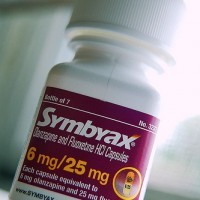Symbyax, manufactured by Eli Lilly, has been linked to serious, life-threatening birth defects.
Approved by the FDA in 2003, Symbyax is used by millions of Americans for anxiety and depression. The FDA is strengthening its warning for the antidepressant Symbyax because it may be associated with birth defects, specifically, congenital heart defects, Persistent Pulmonary Hypertension of the Newborn (PPHN), abdominal and cranial defects.
What You Can Do & How We Can Help
The Schmidt Firm, PLLC is currently accepting Symbyax induced birth defect claims in all 50 states. If you or somebody you know has taken Symbyax and their child has developed a congenital heart defect, Persistent Pulmonary Hypertension of the Newborn (PPHN), abdominal or cranial defect, you should contact our firm immediately for a free case consultation. Please click here to contact our Dangerous Drug Litigation Group or call toll free 24 hours a day at (866) 920-0753.
What is the problem?
Symbyax is used by millions of Americans to treat depression. More specifically, pregnant women have been prescribed Symbyax to help with anxiety involved with their pregnancy. The fetuses of these women using Symbyax or other SSRI antidepressants such as Paxil, Celexa, Lexapro, Prozac, and Zoloft are at a greater risk of developing a birth defect.
Heart Defects
The two most common forms of an SSRI antidepressant congenital heart defect are atrial septal defects or ventricular septal defects.
Atrial septal defect (ASD) is a form of congenital heart defect that enables blood flow between the left and right atria via the interatrial septum. There is a hole in the wall between the two upper chambers of the heart that allows for this blood flow exchange. V
entricular Septal Defect (VSD) is when there is a large opening between the ventricles allowing a large amount of oxygen-rich blood from the heart’s left side through the defect on the right side. It is then pumped back into the lungs, even though it has been oxygenated.
This is wasteful, since blood that’s already been to the lungs is returning there, and blood that needs to go to the lungs is being displaced. The heart, which has to pump an extra amount of blood, is overworked and may enlarge.
Persistent Pulmonary Hypertension of the Newborn (PPHN)
The results of the study have shown that babies born to mothers who took Symbyax were more likely to develop Persistent Pulmonary Hypertension of the Newborn (PPHN), than babies born to mothers who did not take Symbyax during pregnancy.
PPHN is failure of the normal circulatory transition that occurs after birth. It is a syndrome characterized by marked pulmonary hypertension that causes hypoxemia and right-to-left extrapulmonary shunting of blood. With inadequate pulmonary perfusion, neonates develop refractory hypoxemia, respiratory distress, and acidosis.
Abdominal and Skull Defects
SSRI antidepressants like Symbyax may cause two separate congenital abnormalities called Omphalocele and Craniosynostosis .
An omphalocele is a congenital (present at birth) abdominal wall birth defect in which the infant’s intestine or other abdominal organs stick out of the belly button (navel).In babies with an omphalocele, the intestines are covered only by a thin layer of tissue and can be easily seen.
Craniosynostosis is a congenital (present at birth) defect that causes one or more sutures on a baby’s head to close earlier than normal. Sutures are connections that separate each individual skull bones. The early closing of a suture leads to an abnormally shaped head.
Symbyax Birth Defects
There are a variety of defects associated with Symbyax. Our firm is pursing the following types of serious, life-threatening birth defects:
- Atrial Septal Defects (ASD) – also known as ‘hole in the heart’ defects
- Ventral or Ventricular Septal Defects (VSD) – hole in the heart wall
- Valve Problems – malformed or stuck and won’t close
- Tricuspid Valve (Ebstein’s Anomaly)
- Mitral Valve
- Transposition of the Great Arteries / Vessels
- Tetralogy of Fallot (TOF)
- Hypoplastic Left Heart Syndrome (HLHS)
- Hypoplastic Right Heart Syndrome (HRHS)
- Tricuspid Atresia
- Aortic Stenosis
- Pulmonary Atresia
- Patent Ductus Arteriosus (PDA)
- Coarctation of the Aorta
- Truncus Arteriosus
- Tricuspid Valve Stenosis
- Heart Murmur
- Persistent Pulmonary Hypertension of the Newborn (PPHN)
- Pulmonary Stenosis
- Craniosynostosis – cranial skull defect
- Omphalocele – abdominal wall defect
- Gastroschisis – abdominal wall defect
- Esophageal Stenosis
- Club Foot
- Anal Atresia
- Spina Bifida
Do I Have a Symbyax Lawsuit?
The Schmidt Firm, PLLC is currently accepting Symbyax induced injury cases in all 50 states. If you or somebody you know has been injured by Symbyax, you should contact our firm immediately for a free case consultation. Please use the form below to contact our Dangerous Drug Litigation Group or call toll free 24 hours a day at (866) 920-0753.
Attention Lawyers: We consider a referral from another law firm to be one of the greatest compliments. If your firm is interested in referring us your case or for us to send you a list of previous award judgments and/or average referral fees, please visit the Lawyer Referral section of our website.


 The Schmidt Firm, PLLC has been recognized as one of the nation’s leading plaintiffs' law firms and handles cases in all 50 states. We are very proud of our legal achievements, but equally self-respecting of our firm's reputation for providing personal attention to each and every client we represent.
The Schmidt Firm, PLLC has been recognized as one of the nation’s leading plaintiffs' law firms and handles cases in all 50 states. We are very proud of our legal achievements, but equally self-respecting of our firm's reputation for providing personal attention to each and every client we represent.

